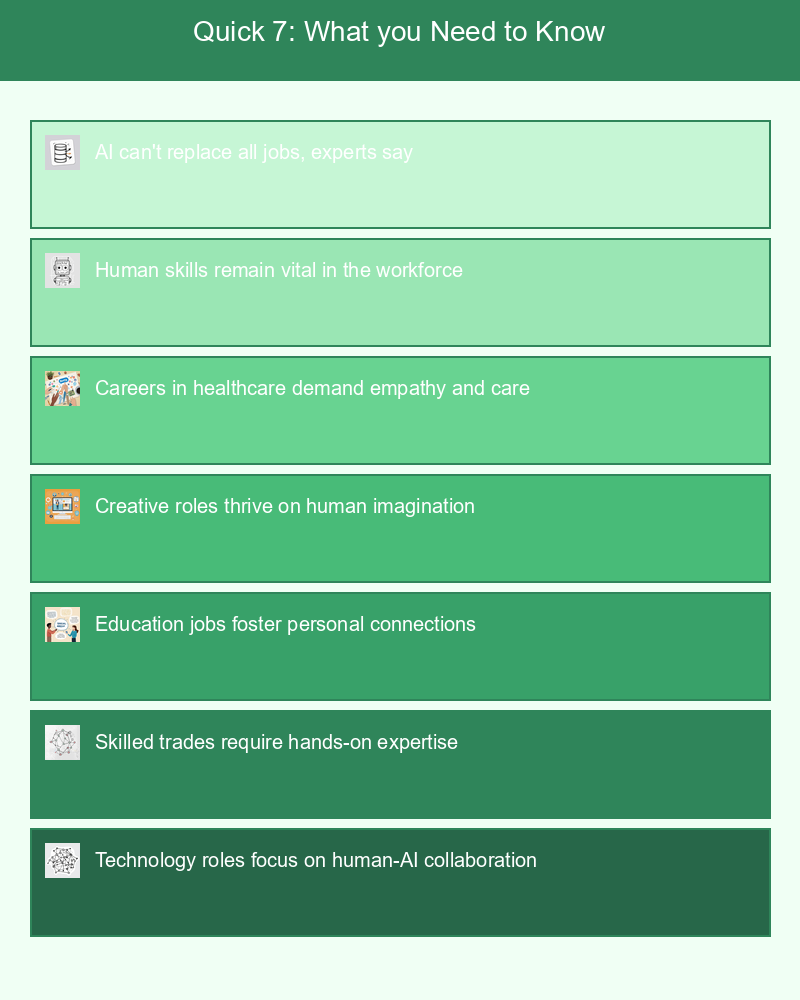Executive Summary
As automation sweeps across industries, largely propelled by artificial intelligence (AI), the job market is undergoing a seismic shift. While some positions face obsolescence, others are evolving or emerging altogether, particularly in areas that demand uniquely human skills. This article delves into the transformative impact of automation on employment, highlighting the types of careers poised to thrive amidst this technological revolution. By understanding the interplay between AI and the workforce, individuals can better prepare for a future where adaptability and human ingenuity are paramount.

Background and Context
Automation has been a defining trend in the modern economy, with AI at the forefront of this transformation. Industries such as information technology, financial services, and professional services are increasingly integrating AI to optimize processes, enhance productivity, and drive innovation. This trend raises crucial questions about the future of work. With AI capable of performing tasks that were once considered the sole domain of humans, the conversation has shifted from whether automation will occur to how it will reshape the workforce landscape.
For technical resources and innovative solutions, please visit EchoesOfCreationUS for specialized technical resources.
The rise of AI technologies has triggered a reevaluation of job roles, particularly for younger generations entering the labor market. As they prepare to embark on their careers, understanding the implications of automation becomes essential for their long-term success. The ongoing dialogue among economists, industry leaders, and educators emphasizes the need for a strategic approach to skill development and workforce readiness.
Current Developments
Recent insights from experts like Barret Kupelian, Chief Economist at PricewaterhouseCoopers (PwC), underscore the dual nature of automation’s impact on employment. While AI is reshaping job requirements and threatening roles that rely heavily on routine tasks, it is also giving rise to new opportunities, particularly in AI development and oversight. The demand for AI-related skills is surging, with projections indicating a dramatic 56% increase in average wages for professionals in AI-skilled jobs by 2024. This marks a significant jump from the previous year’s 25% increase, reflecting the urgent need for talent in this burgeoning field.
Moreover, jobs that are most susceptible to automation are those characterized by repetition, structured input, and limited decision-making capabilities. Roles in manufacturing, data entry, and basic customer service are among those that may be at risk. Conversely, positions requiring emotional intelligence, creativity, and complex problem-solving are likely to withstand the test of automation. The evolving nature of work necessitates a focus on human-centric skills that machines cannot replicate.
Discover exclusive offers and premium content at Active Living Offers – your gateway to enhanced productivity and lifestyle solutions.
Analysis and Implications
The implications of automation extend far beyond job displacement. As industries adapt to incorporate AI, the very definition of work is shifting. This evolution calls for a workforce that can complement AI technology rather than compete with it. Individuals must develop skills that enhance their employability in an AI-influenced landscape, prioritizing adaptability, continuous learning, and creativity.
Furthermore, the emergence of new job roles centered around AI presents both challenges and opportunities. As traditional roles are displaced, the workforce must pivot towards positions that involve the oversight and ethical management of AI systems. This includes roles in AI ethics, compliance, and user experience design—fields that require a deep understanding of both technology and human behavior.
Industry Impact
Different sectors are experiencing varied impacts from automation. In the IT industry, the demand for AI specialists is skyrocketing as businesses seek to harness AI’s potential to streamline operations and drive innovation. The financial services sector is also witnessing a transformation, with AI being utilized for risk assessment, fraud detection, and personalized service offerings. Meanwhile, professional services are leveraging automation for data analysis and decision-making support, allowing human professionals to focus on higher-level strategic tasks.
This nuanced interplay between automation and industry growth highlights the need for businesses to invest in workforce development. Companies that prioritize training and upskilling their employees will not only enhance their operational efficiency but also foster a resilient workforce capable of navigating the challenges posed by automation.
Future Outlook
Looking ahead, the future of work in an automated landscape is likely to be characterized by a symbiotic relationship between humans and machines. As AI continues to evolve, so too will the roles that individuals occupy. Emerging technologies will necessitate a shift in educational paradigms, emphasizing interdisciplinary learning that combines technical proficiency with soft skills. Educational institutions and training programs must adapt to prepare students for careers that may not yet exist.
Moreover, the importance of human-centric skills cannot be overstated. As jobs evolve, attributes such as creativity, empathy, and complex decision-making will become increasingly valuable. Professionals who can leverage these skills in conjunction with AI tools will be well-positioned to thrive in the future job market.
Conclusion with Key Takeaways
The rise of automation and AI is reshaping the job market in profound ways. While certain roles may vanish, new opportunities will emerge, particularly for those who embrace adaptability and continuous learning. Key takeaways from the current landscape include:
- Focus on Human Skills: Creativity, empathy, and complex decision-making will remain crucial in an AI-dominated future.
- Industry-Specific Adaptation: Different sectors will experience varying impacts from automation; businesses must invest in workforce development.
As we navigate this transformative era, understanding and embracing the dynamics of automation will be key to ensuring a prosperous future for both individuals and organizations alike.
Disclaimer: The information presented in this article has been gathered from various publicly available sources and is intended for informational purposes only. While we strive to ensure accuracy, we cannot guarantee that all information is current, complete, or error-free. Readers are advised to verify information independently and consult with qualified professionals before making any decisions based on this content. The views and opinions expressed in this article are those of the sources cited and do not necessarily reflect our official policy or position.
